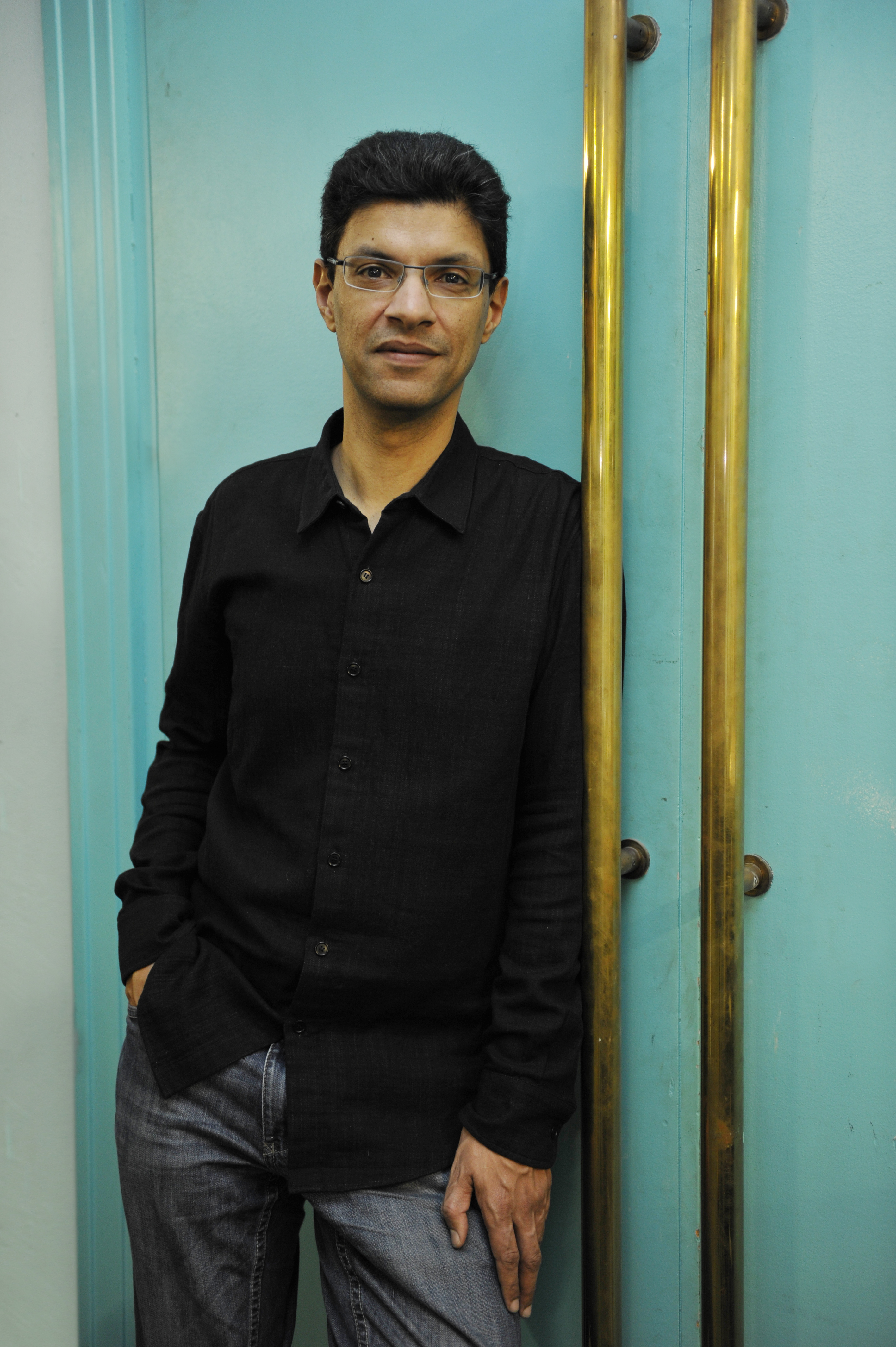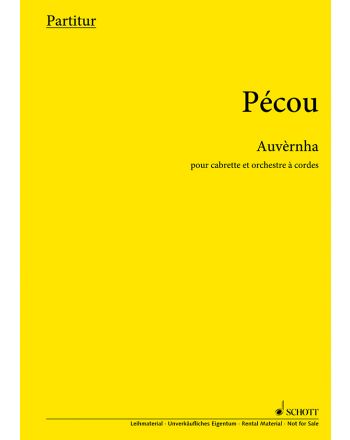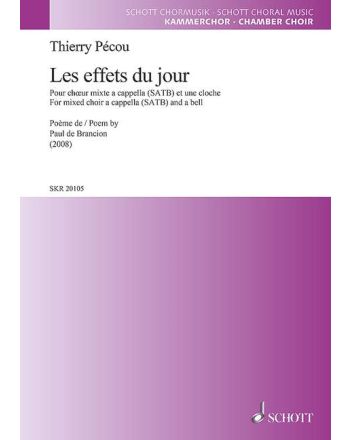
Thierry Pécou
À venir
À propos de Thierry Pécou
In his encounters with traditions, Thierry Pécou dreams of ‘making the whole world resonate’ and thereby restoring the ritual character of music. Music conceived within this spiritual framework directly addresses and captivates the listener. (Jean-Luc Tamby)
Thierry Pécou, born in Boulogne-Billancourt near Paris in 1965, studied piano and additionally orchestration and composition at the Paris Conservatoire where he earned first prizes for both study courses. Scholarships for study abroad took him first to Canada from 1989 to 1993, then to Russia from 1994 to 1995 and subsequently to Spain and Latin America from 1997 to 1999. Travelling and different countries and their cultures have become the chief inspiration for his creative activities.
Shaped by the influences of musical cultures from distant historical periods and locations, Pécou pursues an individual path far from the avant-garde. He was inspired by the language and intellectual world of Pre-Columbian America and Native American civilisations to compose the Symphonie du Jaguar which received its first performance to great acclaim in 2003 played by the Orchestre National d’Ile de France and conducted by HK Gruber. The cantata Passeurs d’eau dating from 2004 also draws inspiration from North American Indians. Traces of other cultures such as Ancient Greece can be found in the concert piece Les filles du feu (for oboe or clarinet and chamber orchestra composed in 1998). Other works additionally make allusions to African and Ancient Chinese music (for example La Barque au rêve clair for erhu and orchestra written in 2007), less as folkloristic quotations, but more in the form of tonal colouring and intimations.
Pécou composes music across a wide range of genres ranging from solo works to orchestral compositions and lieder with piano to music theatre. His orchestral works include Vague de pierre written for the Orchestre Philharmonique de Radio France and Tremendum created for the BBC Symphony Orchestra. Pécou undertook the solo piano part in the premiere of Tremendum and regularly participates in performances of his own works for piano and chamber ensembles. The composer is highly motivated to return repeatedly to his own works and create new interpretations. He founded the Zellig Ensemble in 1998 and was its pianist up to 2010. Pécou is currently the artistic director of the Ensemble Variances in which he also participates as a pianist. In recent years, Pécou has composed several solo concertos: The trumpet concerto Soleil Rouge (2015) for Håkan Hardenberger and the Orchestre Philharmonique de Radio France was followed by La Danse de Shiva (2017) for saxophone and orchestra and the Cara Bali Concerto (2020) written for the pianist Alexandre Tharaud and the Orchestre National de Lyon.
For the Théâtre du Châtelet he wrote the children’s opera Hop et Rats in 2003 and composed the chamber opera Les Sacrifiées based on the work of the same name by Laurent Gaudé in response to a commission from the French Ministry of Culture in 2008 which received its first performance in Nanterre. His full-length opera L’Amour coupable based on the drama “La Mère coupable” by Pierre-Augustin Caron de Beaumarchais was premiered by the Opéra de Rouen in 2010 and was cited as the best world premiere of the year 2010 by the Syndicat de la Critique Théâtre, Musique et Danse. In the chamber opera Nahasdzáán in the Glittering World, based on a libretto by Navajo poet Laura Tohe, traditional healing rituals of the Navajo people are confronted with the environmental and social problems of our time. The world premiere – at the Théâtre des Arts Rouen in 2019 – featured live animals such as vultures, wolves and owls. Pécou's latest opera Until the Lions is based on a book by Indian actress Karthika Nair, in which she poetically adapts the ancient Indian epic Mahabharata. Premiered at the Opéra National du Rhin in Strasbourg in 2022, the piece questions gender images, denounces the violence of war and gives its victims a voice.
Thierry Pécou is the recipient of numerous prizes including the Stéphane Chapelier Clergue Gabriel Marie Prize from Sacem (1990), an award from the UNESCO International Rostrum of Composers for his Stabat Mater (1990), the Georges Enescu Prize from Sacem (1993), the Pierre Cardin Prize from the Académie des Beaux-Arts (1996), the Prix Nouveau Talent from SACD (1999), the prize for Young Composers from Sacem (2004) and the prize from the Fondation d‘entreprise Banque Populaire (also in 2004). In 2010, the Foundation Simone et Cino del Duca from the Institut de France awarded him the Grand Prix de Composition, and in 2016, he received the GRand Prix of the SACEM for symphonic composition. The recording of his Symphonie du Jaguar with the Orchestre Philharmonique de Radio France under the direction of Francois-Xavier Roth issued by harmonia mundi received two awards: the Diapason d’or de l’année 2010 and the award Grand Prix de l’Académie Charles Cros for record recordings.
Thierry Pécou currently lives and works in Rouen.
Liste d'œuvres
Galerie



Chronologie
"Grand Prix de Composition Musicale" from the Fondation Simone et Cino del Duca awarded by the Académie des Beaux-Arts
"Prix de la Meilleure Création Musicale 2010" from the Syndicat de la Critique Théâtre, Musique et Danse for the opera "L'Amour coupable"
"Grand Prix de l'Académie Charles Cros" and "Diapason d'or" for the recording of "Symphonie du Jaguar"
First performance of the chamber opera "Nahasdzáán in the Glittering World" at Théâtre des Arts in Rouen
First performance of the opera "Until the Lions" at Opéra National du Rhin in Strasbourg
Produits
-
for solo violin or flute and double mixed choirCompositeur: Thierry PécouMedia Type: Partition électronique en PDFEdition: Partition de choeurSéries: Edition Schott
Schott Chamber Choir
Instrumentation: violon (ou flûte) et Doppelchoeur (SATB)Langue: AnglaisNuméro du produit: SKR 20101 Q558278En stock9,99 €TTC -
for flute, violin, viola, violoncello and piano soloists and 3 ensemblesCompositeur: Thierry PécouMedia Type: Matériel en location / d'exécutionEdition: Matériel d'exécutionInstrumentation: flûte, violon, alto, violoncelle et piano solistes et trois ensembles
-
for mixed choir a cappella (SATBarB)Compositeur: Thierry PécouEdition: Partition de choeurSérie: Schott Chamber Choir
Instrumentation: choeur mixte (SATBarB)Numéro du produit: SKR 20102Type de produitEn stockPrix à partir de 5,99 €TTC -
pour cabrette et orchestre à cordesCompositeur: Thierry PécouMedia Type: Matériel en location / d'exécutionEdition: Matériel d'exécutionInstrumentation: Cabrette et orchestre à cordes
-
pour soprano, orchestre à cordes et chants traditionnels préenregistrésCompositeur: Thierry PécouMedia Type: Matériel en location / d'exécutionEdition: Matériel d'exécutionInstrumentation: soprano, orchestre à cordes et Zuspielband
-
for 5 female voices, clarinet, trombone, violin and violoncelloCompositeur: Thierry PécouMedia Type: Matériel en location / d'exécutionEdition: Matériel d'exécutionInstrumentation: 5 voix de femmes, clarinette, trombone, violon et violoncelleLangue: Français
-
pour 13 instruments
-
pour piano et orchestreCompositeur: Thierry PécouMedia Type: Matériel en location / d'exécutionEdition: Matériel d'exécutionInstrumentation: piano et orchestre
-
Cantate of Four MountainsCompositeur: Thierry PécouMedia Type: Matériel en location / d'exécutionEdition: Matériel d'exécutionInstrumentation: 2 voix de femmes et ensembleLangue: Français, Anglais
-
pour trois flûtes et orchestreCompositeur: Thierry PécouMedia Type: Matériel en location / d'exécutionEdition: Matériel d'exécutionInstrumentation: 3 flûtes et orchestre
-
pour mezzo-soprano et orchestreCompositeur: Thierry PécouMedia Type: Matériel en location / d'exécutionEdition: Matériel d'exécutionInstrumentation: mezzo-soprano et orchestreLangue: Espagnol
-
Nouvelles pièces pour piano. Petrushka ProjectMedia Type: PartitionInstrumentation: pianoLangue: AnglaisNuméro du produit: ED 21470En stock10,00 €TTC, hors expédition
-
pour soprano et ensembleCompositeur: Thierry PécouMedia Type: Matériel en location / d'exécutionEdition: Matériel d'exécutionInstrumentation: soprano et ensemble
-
for choir with equal voices and one bellCompositeur: Thierry PécouEdition: Partition de choeurSérie: Schott Chamber Choir
Instrumentation: choeurNuméro du produit: SKR 20122Type de produitEn stockPrix à partir de 4,99 €TTC -
Opéra jeune publicCompositeur: Thierry PécouMedia Type: Matériel en location / d'exécutionEdition: Matériel d'exécutionLangue: Français
-
pour orchestre de chambreCompositeur: Thierry PécouMedia Type: Matériel en location / d'exécutionEdition: Matériel d'exécutionInstrumentation: orchestre de chambre
-
pour piano et orchestreCompositeur: Thierry PécouMedia Type: Matériel en location / d'exécutionEdition: Matériel d'exécutionInstrumentation: piano et orchestre
-
pour erhù et orchestreCompositeur: Thierry PécouMedia Type: Matériel en location / d'exécutionEdition: Matériel d'exécutionInstrumentation: erhu et orchestre
-
pour saxophone solo et orchestre d'harmonieCompositeur: Thierry PécouMedia Type: Matériel en location / d'exécutionEdition: Matériel d'exécutionInstrumentation: saxophone et orchestre d'instruments à vent
-
Polyphonic chamber oratorioCompositeur: Thierry PécouMedia Type: Matériel en location / d'exécutionEdition: Matériel d'exécutionInstrumentation: 7 chanteurs, une voix indigène, viole de gambe (violoncelle), batterie et cloches de vacheLangue: Espagnol, Français
-
for violin (or flute) and piano (or cristal baschet)Compositeur: Thierry PécouEdition: Partition et partiesSérie: Edition Schott
Instrumentation: violon (ou flûte) et piano (ou Cristal Baschet)Numéro du produit: ED 22714Type de produitEn stockPrix à partir de 13,99 €TTC -
Concerto for piano and mixed choir (SATB)Compositeur: Thierry PécouMedia Type: Matériel en location / d'exécutionEdition: Matériel d'exécutionInstrumentation: piano et choeur (SATB)Langue: Français
-
for mixed choir a cappella and a bellCompositeur: Thierry PécouEdition: Partition de choeurSérie: Schott Chamber Choir
Instrumentation: choeur mixte (SATB) et clocheNuméro du produit: SKR 20105Type de produitEn stockPrix à partir de 6,99 €TTC -
for six wind instruments, percussion and nine stringsCompositeur: Thierry PécouMedia Type: Matériel en location / d'exécutionEdition: Matériel d'exécutionInstrumentation: ensemble
-
pour orchestreCompositeur: Thierry PécouMedia Type: Matériel en location / d'exécutionEdition: Matériel d'exécutionInstrumentation: orchestre
-
Compositeur: Thierry PécouMedia Type: Partition électronique en PDFEdition: Edition séparéeSérie: Edition Schott
Instrumentation: pianoNuméro du produit: ED 21572 Q11802En stock1,99 €TTC -
for violoncello solo, six instruments and prerecorded whale soundsCompositeur: Thierry PécouMedia Type: Matériel en location / d'exécutionEdition: Matériel d'exécutionInstrumentation: violoncelle solo, 6 instruments et chants des baleines pré-enregistrés
-
for mixed choir, piano and flute ad lib.Compositeur: Thierry PécouAuteur du texte original: Laura ToheMedia Type: PartitionEdition: Partition d'exécutionInstrumentation: choeur (SATB), piano et flûte ad lib.Numéro du produit: SKR 19017Épuisé19,00 €TTC, hors expédition
-
for three flute soloists, flute ensemble and percussionCompositeur: Thierry PécouMedia Type: Matériel en location / d'exécutionEdition: Matériel d'exécutionInstrumentation: 3 flûtes solistes, ensemble de flûtes et percussion
-
pour violon et orchestre à cordesCompositeur: Thierry PécouMedia Type: Matériel en location / d'exécutionEdition: Matériel d'exécutionInstrumentation: violon et orchestre à cordes
-
for men's choir (or mixed choir)Compositeur: Thierry PécouEdition: Partition de choeurSérie: Schott Chamber Choir
Instrumentation: chœur d’hommes / choeur mixteNuméro du produit: SKR 20123Type de produitEn stockPrix à partir de 3,99 €TTC -
pour grand orchestreCompositeur: Thierry PécouMedia Type: Matériel en location / d'exécutionEdition: Matériel d'exécutionInstrumentation: grand orchestre
-
for piano, flute, clarinet and violoncelloCompositeur: Thierry PécouMedia Type: Matériel en location / d'exécutionEdition: Matériel d'exécutionInstrumentation: piano, flûte, clarinette et violoncelle
-
for pianoCompositeur: Thierry PécouEdition: Partie solisteSéries: Edition Schott
Outre-mémoire
Instrumentation: pianoNuméro du produit: ED 22075Type de produitEn stockPrix à partir de 24,99 €TTC -
pour orchestre de chambreCompositeur: Thierry PécouMedia Type: Matériel en location / d'exécutionEdition: Matériel d'exécutionInstrumentation: orchestre de chambre
-
pour cinq chanteurs (SMezAABar) et ensemble instrumentalCompositeur: Thierry PécouMedia Type: Matériel en location / d'exécutionEdition: Matériel d'exécutionInstrumentation: soprano, mezzo soprano, 2 alti, baryton et ensembleLangue: Français
-
pour chœur mixte, chœur d'enfants ad lib. et orchestreCompositeur: Thierry PécouMedia Type: Matériel en location / d'exécutionEdition: Matériel d'exécutionInstrumentation: choeur mixte, choeur d'enfants ad lib. et orchestreLangue: Français
-
for strings, harp, percussions, pre-recorded tapes and instrumental group ad libitumCompositeur: Thierry PécouMedia Type: Matériel en location / d'exécutionEdition: Matériel d'exécutionInstrumentation: cordes, harpe, percussion, séquences pré-enregistrées et groupe instrumental ad libitum
-
Version for piano soloCompositeur: Thierry PécouEdition: Partie solisteSérie: Edition Schott
Instrumentation: pianoNuméro du produit: ED 21783Type de produitEn stockPrix à partir de 14,99 €TTC -
Sephardic melodies for soprano, flute, clarinet, double bass, piano and percussionCompositeur: Thierry PécouMedia Type: Matériel en location / d'exécutionEdition: Matériel d'exécutionInstrumentation: soprano, flûte, clarinette, contrebasse, piano et batterieLangue: Arabe, Araméen, Ladino
-
for rababa, darabouka (and tar) and seven instrumentsCompositeur: Thierry PécouMedia Type: Matériel en location / d'exécutionEdition: Matériel d'exécutionInstrumentation: Rababa, Darabouka (Tar), flûte, clarinette, basson, batterie, violon 1, violon 2, contrebasse
-
pour trompette et orchestreCompositeur: Thierry PécouMedia Type: Matériel en location / d'exécutionEdition: Matériel d'exécutionInstrumentation: trompette et orchestre
-
for pianoCompositeur: Thierry PécouEdition: Edition séparéeSérie: Edition Schott
Instrumentation: pianoNuméro du produit: ED 22713Type de produitEn stockPrix à partir de 13,99 €TTC -
pour quatuor à cordes et orchestreCompositeur: Thierry PécouMedia Type: Matériel en location / d'exécutionEdition: Matériel d'exécutionInstrumentation: quatuor à cordes et orchestre
-
Opéra de chambreCompositeur: Thierry PécouLibrettiste: Jean-Christophe BlondelMedia Type: Matériel en location / d'exécutionEdition: Matériel d'exécutionInstrumentation: clarinette, saxophone, violon, piano et électroacoustiqueLangue: Français
-
pour clarinette, trombone, violon, violoncelle, 5 voix de femmes et orchestreCompositeur: Thierry PécouMedia Type: Matériel en location / d'exécutionEdition: Matériel d'exécutionInstrumentation: clarinette, trombone, violon, violoncelle, 5 voix de femmes et orchestreLangue: Français
-
Liste des Œuvres Publiées par SchottEn stock0,00 €TTC, hors expédition
-
Concerto-carnaval pour piano et orchestreCompositeur: Thierry PécouMedia Type: Matériel en location / d'exécutionEdition: Matériel d'exécutionInstrumentation: piano et orchestre
-
for fourteen instrumentsCompositeur: Thierry PécouMedia Type: Matériel en location / d'exécutionEdition: Matériel d'exécutionInstrumentation: ensemble
-
Échos du MahabharataCompositeur: Thierry PécouMedia Type: Matériel en location / d'exécutionEdition: Matériel d'exécutionLangue: Anglais


































